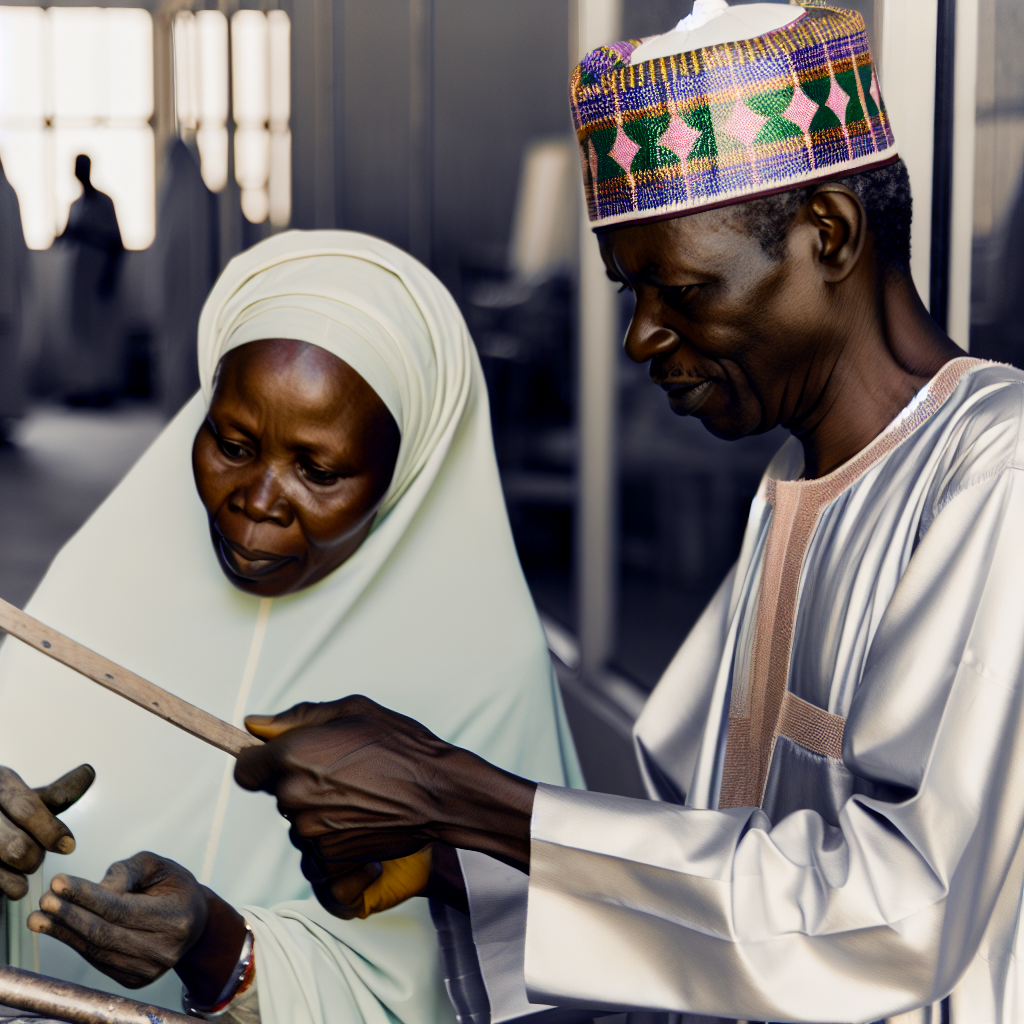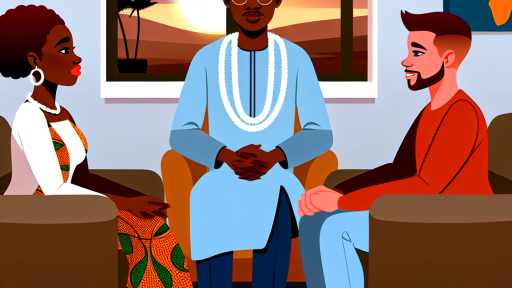Definition and Overview of Compromise in Marriages
Compromise is a fundamental aspect of healthy marriages.
It involves mutual concessions to achieve harmony.
In marriages, compromise addresses differing beliefs and values.
This practice encourages understanding and patience between partners.
Moreover, it helps strengthen the relationship over time.
The Role of Compromise in Nigerian Marriages
Nigerian marriages often face unique cultural challenges.
Compromise plays a crucial role in navigating these challenges.
Couples learn to balance traditions with modern values.
As a result, they create a more cohesive family unit.
Furthermore, this practice promotes conflict resolution.
Benefits of Compromise in Marriages
Compromise fosters emotional connection and intimacy.
It enhances communication skills within the relationship.
Additionally, it builds trust and respect between partners.
Couples develop a sense of teamwork through compromise.
This process often leads to greater satisfaction in the marriage.
Challenges to Compromise
Despite its benefits, compromise can pose challenges.
Some individuals struggle to let go of their preferences.
This can result in feelings of resentment or frustration.
Effective communication is vital to overcome such hurdles.
Couples may need to revisit their expectations regularly.
Cultural Perspectives on Compromise in Nigerian Society
Understanding Compromise in Nigerian Marriages
Compromise plays a significant role in Nigerian marriages.
It fosters harmony and unity among couples.
This principle reflects the broader values of respect and understanding.
Nigerian culture emphasizes communal living over individualism.
Thus, compromises are essential for maintaining family bonds.
Traditional Views on Compromise
Traditionally, marriages involve families, not just individuals.
Parents and elders often guide couples in their decisions.
They stress the importance of mutual respect and support.
Consequently, compromise becomes a necessary tool for resolution.
Nigerian folklore often highlights the virtues of patience and negotiation.
Modern Perspectives and Influence
In contemporary Nigeria, views on marriage continue to evolve.
Young couples increasingly blend tradition with modern values.
This shift embraces personal happiness alongside familial responsibilities.
As a result, partners must negotiate their needs more than ever.
Compromise has become vital in addressing these changing dynamics.
The Role of Religion in Compromise
Religion significantly influences views on marriage in Nigeria.
Both Christianity and Islam emphasize the importance of harmony.
Religious leaders often advocate for understanding and flexibility.
This guidance reinforces the necessity for compromise among couples.
Couples are encouraged to pray for wisdom during conflicts.
Challenges to Compromise
Despite its importance, compromise can be difficult.
Cultural norms often dictate specific roles for husbands and wives.
These roles may conflict with the need for equality in partnership.
Furthermore, differing expectations can lead to misunderstandings.
Effective communication is essential for overcoming these obstacles.
Promoting a Culture of Compromise
Nurturing a culture of compromise can strengthen Nigerian marriages.
Couples should engage in open dialogue about their feelings.
Workshops and counseling can provide valuable tools for communication.
Communities can also play a role in normalizing compromise.
Encouraging shared experiences builds empathy and understanding.
The Role of Communication in Achieving Compromise
Understanding Effective Communication
Effective communication is vital in any relationship.
It helps partners articulate their thoughts and feelings clearly.
Moreover, active listening fosters mutual understanding.
This practice encourages respect for each person’s perspective.
Establishing Open Dialogue
Open dialogue creates a safe space for discussion.
Couples should feel free to share their concerns and desires.
This openness empowers partners to express their opinions.
Additionally, regular check-ins strengthen this dialogue.
Utilizing Non-Verbal Cues
Non-verbal communication significantly impacts marital harmony.
Body language can express emotions more powerfully than words.
Eye contact, tone, and gestures enhance the conversation.
Thus, being aware of these cues is crucial in discussions.
Compromise Through Negotiation
Navigating disagreements requires skilled negotiation.
Both partners need to approach issues with flexibility.
Finding common ground facilitates compromise.
Each partner’s willingness to give and take is essential.
Emphasizing Empathy in Conversations
Empathy plays a critical role in effective communication.
Understanding each other’s feelings alleviates tension.
This connection allows couples to navigate conflicts smoothly.
When both partners empathize, they create stronger bonds.
Practicing Patience and Understanding
Patience is fundamental during discussions about compromise.
Rushed conversations can lead to misunderstandings.
Consequently, taking time to process feelings is beneficial.
Understanding each other’s pace fosters a more productive dialogue.
You Might Also Like: The Role of Faith and Religion in Building Strong Nigerian Marriages
Examples of Compromise in Different Nigerian Cultures
Yoruba Culture
In Yoruba culture, marriage often requires mutual respect among partners.
Couples negotiate roles and responsibilities during their relationship.
Additionally, they value family opinions in decision-making.
This involvement fosters a sense of community and togetherness.
Ibo Culture
Ibo culture emphasizes the importance of wealth in marriage.
Financial resources are often part of the negotiations between families.
Couples may agree on sharing financial burdens to ease stress.
This allows both partners to work towards common financial goals.
Hausa Culture
Hausa marriages often involve traditional practices that promote compromise.
Many couples engage in discussions to understand each other’s needs.
Women in Hausa culture may negotiate their roles within the home.
This negotiation leads to a balanced distribution of responsibilities.
Inter-Cultural Marriages
Inter-cultural marriages in Nigeria showcase diverse compromise strategies.
Couples merge traditions from both cultures, blending their practices.
This fusion often requires open dialogue about cultural beliefs.
As a result, partners learn to respect and appreciate each other’s backgrounds.
Hence, they create a shared identity that strengthens their bond.
Learn More: Building a Solid Foundation for Long-Lasting Marriages in Nigeria
Benefits of Compromise for Relationship Longevity
Fostering Mutual Understanding
Compromise fosters mutual understanding between partners.
It encourages open communication about needs and desires.
By listening actively, couples can appreciate each other’s viewpoints.
This understanding builds a stronger emotional connection.
Reducing Conflict
Effective compromise significantly reduces conflicts in marriages.
Partners learn to navigate disagreements with respect and patience.
As a result, they can resolve issues before they escalate.
This creates a more peaceful home environment.
Enhancing Trust and Respect
Compromise enhances trust and respect between partners.
When one partner makes concessions, the other feels valued.
This mutual respect strengthens the bond of marriage.
Consequently, partners are more willing to support each other.
Encouraging Teamwork
Compromise encourages a sense of teamwork in a marriage.
Couples work together to find solutions that benefit both.
This collaborative approach fosters unity and shared goals.
Ultimately, it cultivates a spirit of partnership.
Promoting Flexibility and Adaptability
Compromise promotes flexibility and adaptability in relationships.
Couples learn to adjust their expectations and preferences.
This adaptability helps navigate life’s inevitable changes.
As a result, partners become more resilient together.
Building Long-term Satisfaction
Long-term satisfaction is achievable through compromise.
When couples find a middle ground, they feel fulfilled.
Successful compromises lead to lasting happiness and stability.
This ongoing satisfaction strengthens the marital bond.
Find Out More: Building a Strong Foundation of Trust in Nigerian Marriages

Challenges to Compromise in Nigerian Marriages
Cultural Expectations
Nigerian marriages often face rigid cultural expectations.
These expectations can create pressure on couples for conformity.
For instance, traditional roles may dictate behavior and decisions.
Consequently, such norms can hinder open communication.
Lack of Communication Skills
Effective communication is vital for compromise.
Some couples struggle with expressing their feelings.
This lack of articulation can lead to misunderstandings.
Additionally, many people fear conflict, preventing them from voicing concerns.
Economic Pressures
Financial instability often strains marital relationships.
Economic pressures can cause stress and discord between partners.
For example, disagreements over budgeting can arise easily.
As a result, couples may find it difficult to compromise.
Influence of Extended Family
Extended family involvement can complicate marital dynamics.
Family opinions may overshadow individual desires in decision-making.
This interference can create conflicts between spouses.
Thus, couples may struggle to find common ground.
You Might Also Like: Key Foundations for a Successful Marriage in Nigeria
Strategies for Effective Compromise between Spouses
Prioritize Open Communication
Effective compromise starts with open communication between partners.
Each spouse should express their feelings and needs clearly.
Listening actively without interrupting is essential for understanding.
This practice fosters trust and respect within the relationship.
Identify Common Goals
Couples should identify shared goals and values, which can guide compromise.
Discussing long-term aspirations helps align both partners’ interests.
Common goals can create a sense of teamwork and unity.
Be Willing to Adapt
Flexibility is key when navigating differences in a marriage.
Both spouses should be willing to adjust their expectations and preferences.
Adaptability strengthens the bond and promotes mutual satisfaction.
Establish Boundaries
Setting healthy boundaries creates a safe environment for compromise.
Each partner must respect the other’s limits to ensure comfort.
Clearly defined boundaries prevent misunderstandings and resentment.
Practice Empathy
Empathy plays a crucial role in successful compromise.
Understanding your partner’s perspective fosters compassion.
This understanding makes it easier to find mutually acceptable solutions.
Utilize Problem-Solving Techniques
Employing problem-solving techniques can enhance the compromise process.
Structured approaches help clarify issues and identify solutions.
Techniques such as brainstorming together can yield creative options.
Seek Professional Guidance if Necessary
Sometimes, couples may benefit from professional assistance.
Therapists can provide tools and strategies for effective communication.
This support can bridge gaps and equip spouses for healthier compromises.
Case Studies: Successful Compromise Stories among Nigerian Couples
Emeka and Ndidi: Balancing Career and Family
Emeka and Ndidi faced challenges with their careers and family life.
Emeka prioritized his engineering job while Ndidi managed their children.
Initially, they struggled to find time for each other.
However, they realized compromise was essential to their happiness.
Emeka adjusted his work schedule to be more present at home.
Meanwhile, Ndidi took on part-time work, easing her responsibilities.
This balance allowed them to strengthen their relationship.
The couple expressed that communication was key during this transition.
Ultimately, their commitment to each other flourished amidst shared duties.
Chinwe and Olu: Cultural Differences Resolved
Chinwe and Olu came from different cultural backgrounds.
This variance led to some misunderstandings early in their marriage.
Chinwe valued traditional ceremonies, while Olu preferred modern celebrations.
To navigate this, they held discussions about their cultural values.
They agreed to incorporate elements from both cultures in their celebrations.
This compromise deepened their appreciation for each other’s heritage.
As a result, they created unique and meaningful traditions of their own.
Their marriage became a beautiful blend of cultures, strengthening their bond.
Aisha and Tunde: Disagreements on Finances
Aisha and Tunde struggled with financial disagreements in their marriage.
Aisha preferred to save money, while Tunde enjoyed spending on experiences.
Initially, this difference caused tension between them.
However, they realized they needed a plan to resolve their differences.
They created a joint budget that reflected both their priorities.
For instance, they allocated funds for savings and leisure activities.
This compromise helped them achieve financial stability while having fun.
Their collaboration taught them the value of teamwork in financial matters.
Funmi and Dapo: Navigating Parenting Styles
Funmi and Dapo had distinct parenting styles that sometimes clashed.
Funmi adopted a more structured approach, while Dapo favored flexibility.
This created confusion for their children, which they recognized.
After attending parenting workshops, they learned to appreciate each approach.
They devised a plan to blend structure with adaptability.
This allowed each parent to be involved actively and effectively.
The children benefitted immensely from this balanced parenting approach.
Ultimately, Funmi and Dapo’s compromise created a harmonious family environment.
Additional Resources
The Lancet Nigeria Commission: investing in health and the future of …




